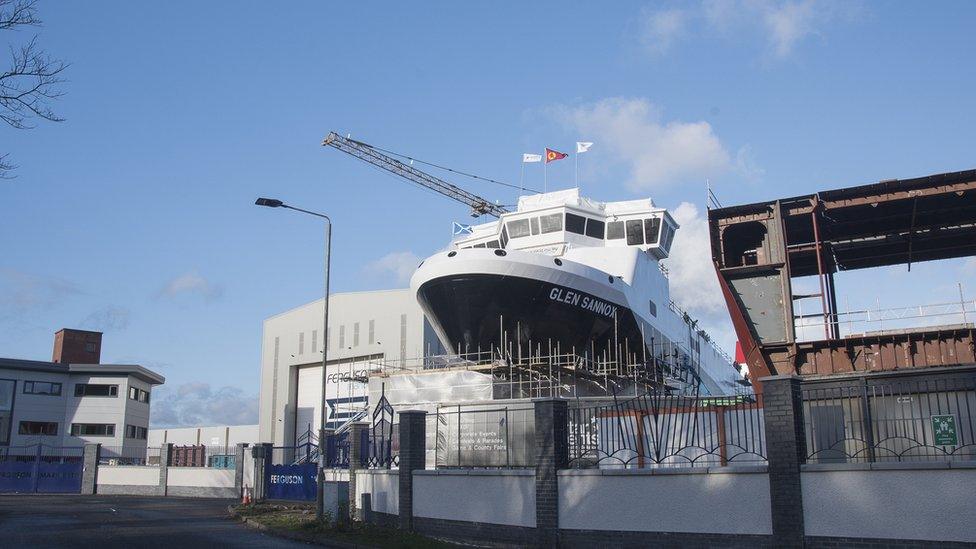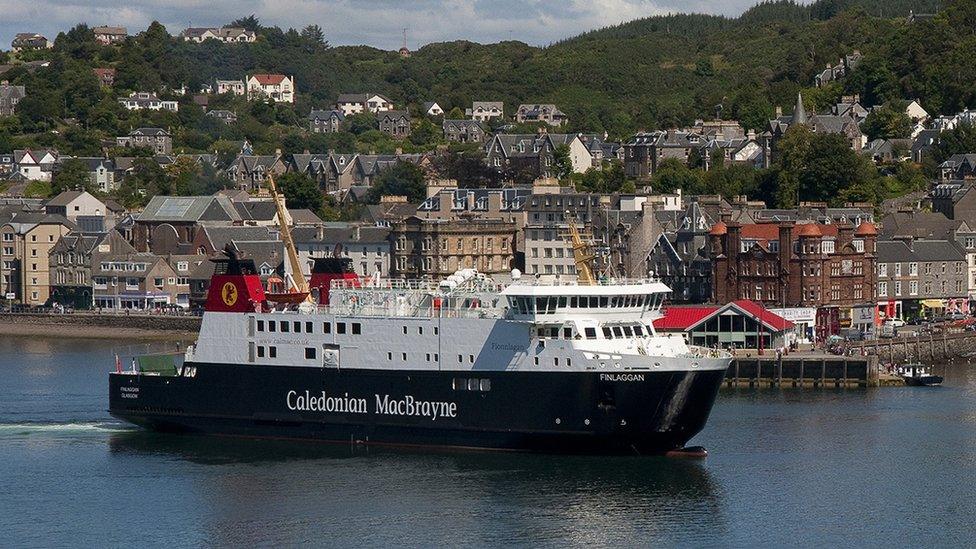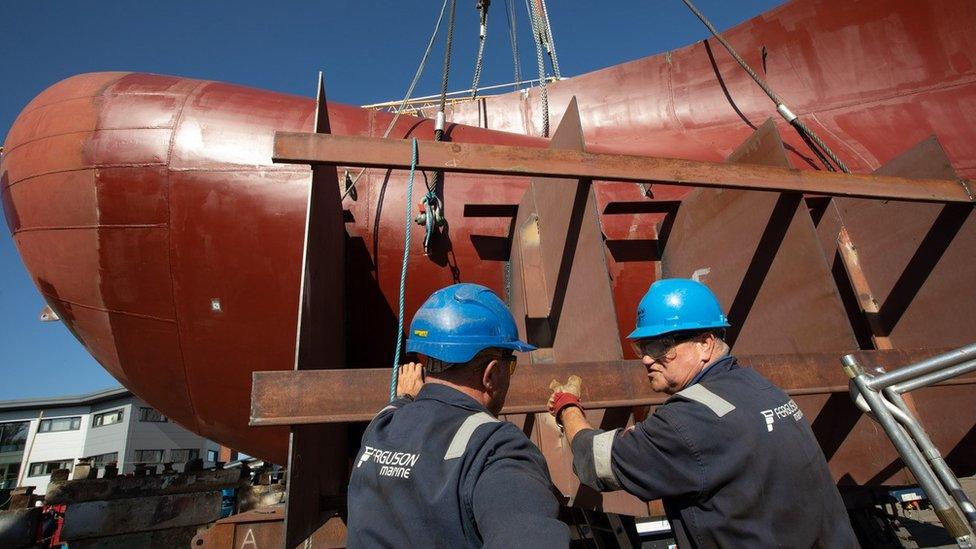Nationalised shipyard misses out on ferries order
- Published

Ferguson went into administration following a dispute over the last major order for CalMac ferries
The nationalised Ferguson shipyard has missed out on an order to build two new CalMac ferries.
The Inverclyde yard was among 11 bidders for the order to replace ships on the Islay route, but failed to make the shortlist.
The four shipyards which will now submit detailed tenders are based in Poland, Romania and Turkey.
Ferguson Marine said it was "disappointed" but would learn lessons as it looks for future work.
The new ships will be the first major order by CMAL, which procures vessels for CalMac, since Glen Sannox and an as-yet unnamed ship, known as Hull 802, which are still under construction at the Ferguson shipyard.
Glen Sannox is currently due to be delivered in the second half of next year, more than four years late, with the two ships costing the taxpayer more than double the original contract price.
Problems with the order dragged the yard back into administration in 2019 and since then it has been wholly-owned by the Scottish government, which also owns CMAL and CalMac.

The new ships will replace MV Hebridean Isles and allow MV Finlaggan (pictured) to be re-deployed to another route
The new order for the Islay route will be for two 94.8m long vessels to replace MV Hebridean Isles - which is 36 years old - and MV Finlaggan which was launched in 2011. MV Finlaggan would then be redeployed to a different route.
The new ships will be larger but more fuel efficient than the current vessels and will have greater vehicle capacity.
Unlike the order for Glen Sannox and Hull 802, they will not use liquefied natural gas (LNG) for the engines but will instead have diesel-electric propulsion systems, making use of lithium batteries where possible, for instance when manoeuvring in port.
The four shortlisted shipyards which will now submit more detailed bids are Damen Shipyard in Romania, Remontowa Shipbuilding in Poland, and Turkish shipyards Sefine Denizcilik Tersanecilik Turizm, and Cemre Marin Endustri.
Jim Anderson, director of vessels at CMAL, said: "We received interest from many shipyards across the world, and carried out robust assessment of their technical and financial suitability to take on this project.
"Four shipyards scored the highest across both criteria and have now been issued an ITT (invitation to tender) for the contract.
"This stage of the procurement process will take around six months, and we hope to award the contract to the winning shipyard at the end of March 2022."
'Hammer blow'
The GMB union, which represents the Ferguson workforce, said Scotland's commercial shipbuilding sector was "mirroring the failure of our offshore wind sector".
"Ferries paid for by the public purse will be manufactured in Eastern Europe or Turkey, that's jobs and value that should be coming to Inverclyde going abroad," said GMB Scotland organiser Gary Cook.
Scottish Labour's transport spokesman Neil Bibby said it was "hammer blow" to Scottish shipbulding, adding: "This announcement means more jobs and more money going overseas at a time of economic crisis."
Scottish Conservative transport spokesman Graham Simpson said: "It's humiliating for the SNP that ships which could be built in the west coast of Scotland are instead going to be welded together in Eastern Europe.
"The SNP let down our shipyards so badly that they are missing out on work to Romania, Poland and Turkey."
For the Liberal Democrats, economy spokesman Willie Rennie said: "It is a damning indictment of the Scottish government's utter failure to secure high tech, high wage jobs that there is no shipyard in Scotland on this shortlist."
A Scottish government spokesperson said: "While it is disappointing that Ferguson Marine have been unsuccessful on this occasion, we are fully committed to supporting the yard to secure a sustainable future, including a pipeline of future work, to help protect jobs and commercial shipbuilding on the Clyde."

The bulbous bow section is fitted to Hull 802 at Ferguson Marine as work continues on the previous big order for CalMac ferries
Ferguson Marine said it had put forward a "robust bid" for the new order but it respected CMAL's decision.
A spokesperson added: "Scotland's public sector ferries will, of course, continue to be future business targets for the shipyard, but they are not the sole focus.
"We believe there is a significant opportunity for contracts and business growth in the build of complex vessels in the 40 to 100m range, which includes offshore patrol vessels and service operation vessels.
"We are actively pursuing opportunities of this nature, which exist in Scotland and around the world, and we remain highly focused on completion of the dual fuel ferry project, which is a top priority."
The Port Glasgow shipyard has been extensively modernised since it first went into administration in 2014 and was taken over by businessman Jim McColl. Its workforce has risen to more than 450.
Mr McColl and CMAL have blamed each other for problems with the previous ferry order which led to the yard going into administration again five years later.
The "turnaround director" appointed by the Scottish government, Tim Hair, recently told the BBC that investment was continuing at Ferguson Marine and he was confident the yard would be competitive by the time it wins its next major order.